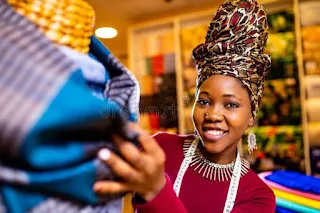By Olumide Labulo
In Nigeria, fashion isn’t just about fabric and fine finish—it’s about feelings. Real, raw, unfiltered feelings. And if there’s anyone who knows this truth more than the person wearing the clothes, it’s the tailor behind the stitches. Walk into any Nigerian tailor’s shop (Do they still use this word?) and you’ll find more than just spools of thread and abandoned zippers. You’ll find deep sighs, silent prayers, unsolicited confessions, and sometimes even tears—because behind every lace blouse is a story, and behind every corset is a crisis. What’s meant to be a simple fitting often turns into a full-blown therapy session, with the tailor cast in the role of (a) listener, hype person, and unofficial life coach.
It usually starts with a hopeful client bringing her fabric, ten Pinterest screenshots, and big dreams for a wedding or birthday slay. But the moment that zipper resists or the sleeve looks “too churchy,” the truth starts to spill out. "I’ve added weight; it’s heartbreak jare." "If this outfit doesn’t give him proposal energy, I’m not going again." “My mummy says it’s too tight, but I’m tired of living holy.” Tailors don’t just adjust hems; they adjust expectations, body insecurities, broken hearts, and cultural guilt. They hold the stories of people who are dancing through pain, hiding worry under sequins, and sewing confidence into uncertain fabric. And through it all, they maintain a calm face, even when what they really want to say is, “Madam, your problem is not the cloth o.”
Tailors in Nigeria are more than artisans; they are frontline emotional responders in gele and chalk-stained measuring tape. They've become confession booths for people who can't afford therapy but desperately need to vent. Abi I lie? Lol. While they pin your waist and adjust your bust, they’re also hearing about your man issues, your boss at work, your mother-in-law’s insults, and how the event you’re sewing for might make or break your social life. The studio becomes a sacred space where women find a form of healing, even if temporary, through fitting into something beautiful: literally and figuratively. And it’s not just the women; men too come with their agbada ambitions and insecurities. Some want to look richer than they are, others want to outshine their ex’s new boo at a naming ceremony. Fashion, in Nigeria, is therapy with measurements.
The humour lies in the details: a bride crying over her corset not giving hourglass, a birthday girl demanding her slit be “Jesus-friendly but also deadly,” or the auntie who insists she must “scatter the event” with a sleeve longer than a thesis. Through all of it, the tailor must remain sane. Because in Nigeria, if you ruin someone’s outfit, you might not just lose a customer. You might even trigger a generational curse. This is more like a usual thing. Tell me a tailor has never "showed you pepper" before! Yet somehow, they keep showing up. Patient, precise, prayerful. They offer comfort through adjustments and encouragement through compliments like “This colour is your colour,” or “You go shut down that wedding, no worry.”
In a society where mental health is still side-eyed and vulnerability is wrapped in sarcasm, tailors offer a form of soft therapy. They allow people to exhale, to be themselves, to be seen. So the next time your tailor delays your cloth, take a moment. Maybe they’re not just overbooked—maybe they’re carrying the emotional baggage of ten other clients, each one stitched between the seams of style and survival. Because in this country, some of the best therapists don’t have couches—they have sewing machines. This will only be different if you never told your tailor what they didn't need to hear.






